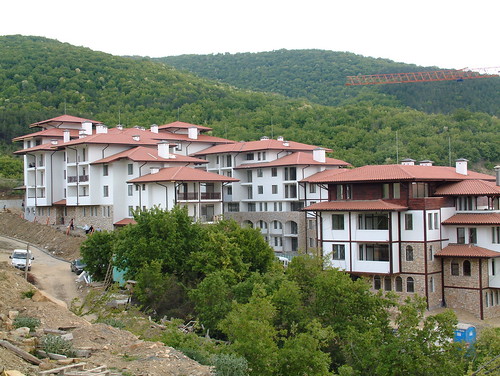THE number of Welsh families buying property abroad is on course to double within the next seven years, with Bulgaria proving the hot destination.
Even first-time buyers priced out of the domestic market are turning to the former Soviet bloc nation to get a foothold on the property ladder, says Swansea-based Britannia Overseas Property.
Britannia - one of the UK's leading developers in Bulgaria - say impending EU membership and low property prices are helping money pour into the Black Sea resort nation.
Such is demand, Bulgaria last year recorded an average property price increase of 47.5 % with experts predicting values will more than double over the next 12 months. Britannia's Bulgarian ski and coastal development properties sell on average for £45,000.
Attracted by its long, hot summers and the Black Sea beaches' white sands the number of foreign tourists visiting Bulgaria has increased by almost 50%, with those from the EU growing by nearly 90%, over the past two years.
Andy Moore, former Wales rugby international and Britannia's joint managing director, told the Western Mail yesterday, "The majority of our local investors are buying properties on the coast or in mountain resorts for capital growth, rental income and a chance to visit for their own holidays.
"Many have previously owned property in Spain and the UK, but are moving their money to Bulgaria, as some see it as like Spain years ago, and Ireland before it joined the EU, offering the potential for similar returns."
Marc Davies and his wife Dawn bought a studio apartment in the Bulgarian ski resort of Bansko a month ago for £35,450 as an investment. The couple, from Mayals, Swansea, say they were put off buying an investment property here by inflated prices.
Salesman Mr Davies said, "If you buy property here now the rental income will not even cover the mortgage. There are very few properties here now where you can completely re-do the house and then make money on it."
Mr Davies, 32, who has never visited Bulgaria, is hoping to rent out the property during the ski season between November and February's end.
"They're building a golf course here now so there should be plenty of opportunities for a rental income," he said.
"But even if I can only rent it out during the skiing season it should still make money for me."
But Melfyn Williams, a past president of the National Association of Estate Agents, whose company Williams & Goodwin has several office across North West Wales, said buying abroad also has its downsides.
He said, "The track record has shown that investment in bricks and mortar in almost any country is a sound one and at the moment some countries such as those coming into the EU are experiencing good capital growth.
"The downside is that if something goes wrong you cannot go round the corner to sort it out.
"There have also been stories whereby couples have bought and then people have turned up with the right to take a bit of their garden to develop on it.
"In other cases people have come back and claimed the land the house was on."
And Mr Williams suggested the domestic property market in parts of Wales has outperformed Bulgaria over the past year.
"It was only a couple of weeks ago that one paper was reporting that prices have risen on Anglesey by 252%. So yes, the price rises in Bulgaria are good, but?"
Mr Moore said cheaper air travel, the strong pound and the recent boom in the housing market mean that owning a home overseas was now the equivalent of buying a holiday caravan 20 years ago.
"With the poor returns on the stocks and shares market and the uncertainty surrounding pension funds, more and more ordinary people invest their hard-earned cash into bricks and mortar by buying a property abroad," he said.
Buying abroad soars
A study presented to the Association of British Travel Agents revealed that home ownership abroad will double over the next five to seven years.
The World Trade Organisation forecasts that by 2010, Bulgaria will be visited annually by at least 20 million tourists, making it one of the world's most promising international tourist destinations.
The booming demand for homes in the sun has seen Britons' spending on second homes treble in two years. The UK is now spending £6bn per year on holiday homes abroad - compared to £2bn per year just two years ago.
In the next few months alone, an estimated 80,000 Britons are expected to buy a second home.
And while most will be used for holidays and short breaks, an increasing number will be bought as long-term investments and rented out to generate income.
Source:
icWalesRelated links:
Sofia Echo: Bulgarian Lures more Welsh





